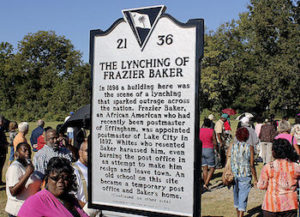
*On this date in 1898, Frazier B. Baker was lynched. He was a Black teacher appointed as postmaster of Lake City, South Carolina, 1897 under the William McKinley administration.
After Frazier Baker had been appointed postmaster of Lake City, local whites objected and had undertaken a campaign to force his removal. When these efforts failed to dislodge Baker, a mob attacked him and his family at night at their house, which also served as the post office. After the 1896 Presidential election, the William McKinley administration appointed hundreds of Blacks to post masterships across the Southern United States during his remaining tenure as part of patronage jobs to build local networks. These recess appointments were resisted by local whites, who resented any Black Republican officeholders, especially appointments made by an outgoing administration.
They claimed to fear that the increased political power of Black postmasters would embolden them to proposition white women. Frazier B. Baker, a married 40-year-old schoolteacher who was the father of six children, was appointed postmaster of Lake City, South Carolina, and immediately encountered fierce opposition from local white conservative Democrats. While the surrounding Williamsburg county was 63% Black, Lake City was overwhelmingly white, with fewer than a dozen Black residents. Whites initiated a boycott of the Lake City post office and circulated petitions calling for Baker's dismissal.
One complaint was that Baker, a member of the Colored Farmers Alliance, had cut mail delivery from three times a day to one after threats against his life were made. A postal inspector arrived to investigate the complaints and recommended that the post office be closed; in response, a white mob burned it down with the expectation that no one would rent space for use as a post office while Baker remained postmaster. However, the government obtained space on the outskirts of town, and a lessening of racial tension led Baker to send for his family in February 1898.
Threats against Baker's life were made as whites remained hostile to his presence. Baker communicated these threats to his superiors in Washington. At 1:00 AM on February 21, 1898, the Baker family awoke to find their house (which also served as the post office) on fire. He and his infant daughter Julia Baker died at his house after being fatally shot during an attack by a white mob on February 22, 1898. The mob set the house on fire to force the family out. His wife Lavinia and two of his other five children were wounded but escaped the burning house and mob and survived.
Lavinia, wounded by the same bullet that had killed her daughter, rallied her family to escape the burning house, and they ran across the road to hide under shrubbery in an adjacent field. After waiting for the flames and gunfire to subside, Lavinia made her way to a neighbor's home, where she found one daughter waiting. They were later joined by the oldest, Rosa. Rosa had been shot through the right arm and fled the house as an unidentified armed white male pursued her. Only Sarah (age 7) and Millie (age 5) escaped unscathed. The survivors remained in Lake City for three days but received no medical treatment. In 2019, the Lake City, NC, post office was named after Franklin Frazier.